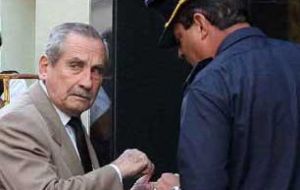MercoPress. South Atlantic News Agency
Uruguayan former military dictator charged and jailed
 Former military dictator is escorted to a Police van
Former military dictator is escorted to a Police van Uruguay's last military dictator, former General Gregorio Alvarez, was charged Monday with the forced disappearance of political prisoners. Human rights activists who have long campaigned for his prosecution cheered on the news and the country's trade union confederation called for a march in support of democracy in downtown Montevideo.
Alvarez, now 82 and retired, was the army general who led Uruguay from 1981 until shortly before the country restored democracy in 1985. In 1978 he had been named Commander in Chief of the Army but since the early seventies was identified as one of the main officers behind the coup that overthrew decades of democracy in Uruguay. Arrested without incident at his home on Monday, he was sent to a military prison to await trial in connection with the disappearance of some 40 Uruguayan political prisoners who were seized by military rulers in neighboring Argentina and secretly returned to Uruguay in 1977 and 1978, prosecutor Mirtha Guianze said. His arrest is a "historic moment" for human rights, said activist Oscar Lopez Goldaracena, whose group, Relatives of the Detained and Disappeared, has campaigned for justice for years. However the defense attorneys following the decision announced they had given up the defense of their client since the "legal and constitutional framework which protects the due process of law and guarantees for the defense of any citizen" have proved non existent. Dr. Carlos Curbelo Tammaro said that prosecutor Mirtha Guianze "was deliberately chosen" and she "has monopolized all the criminal cases against the military officers actively involved in the military process (1973/1985) and for months has collected evidence for the case without giving the defense access, knowledge or monitoring of such procedure". Gregorio Alvarez said in earlier court appearances that he knew nothing of the illegal abductions and forced disappearances, but the prosecutor has argued that Alvarez was in a position to know what happened as former army commander in chief and later, de facto president. Alvarez has admitted that as commander in chief he considered himself the ultimate responsible for all actions committed while he held the post. Prosecutors say Uruguayan political prisoners were secretly airlifted from Argentina as part of "Operation Condor," in which South America's right-wing military regimes cooperated, with secret help from U.S. intelligence agencies, to crush leftist dissent and leave no sanctuary for dissidents fleeing their countries. The military ruled Uruguay between 1973 and 1985. Argentina was under military dictatorship from 1976 until 1983; Brazil from 1964 to 1985 and Chile from 1973 to 1991. Some 150 Uruguayan activists remain missing, believed to have been seized by governments of the era. Argentines are still seeking information about nearly 13,000 officially listed as dead or missing from the period of military rule. Alvarez's wife, Rosario Flores, told that police and an army officer came to their home in the Uruguayan capital early Monday and her husband went without protest after charges were filed by Judge Luis Charles. "My husband was very peaceful," she said by telephone. However Flores complained that prosecutors failed to make public the evidence against Alvarez: "Not even his lawyer had access to the evidence". She said her husband was taken to a military prison where other former officers suspected of human rights violations are housed in a special wing. The detention of Alvarez comes 13 months after the arrest of the man who headed the first military-dominated government, Juan Maria Bordaberry, who faces 14 homicide charges, related to "dirty war" killings of the 1970s. He is under house arrest due to health problems. Retired armed forces officers, in a communiqué, complained that the Alvarez detention violates the spirit of a 1986 amnesty benefiting former military and leftist guerillas alike. But the courts have rejected Alvarez's challenge of the investigation into Uruguayans who were seized beyond national borders. Human rights lawyers have successfully argued before the Uruguayan courts that crimes committed outside the country are exempt from the amnesty. This is also the first time that the "forced disappearance" of people crime has been applied in the Uruguayan legal system. "Yes, it's the first time it has been applied in Uruguay", admitted prosecutor Guianze. Two other officers, from the Navy were also charged on Monday for similar crimes and sent to a special jail for incarcerated military officers.




Top Comments
Disclaimer & comment rulesCommenting for this story is now closed.
If you have a Facebook account, become a fan and comment on our Facebook Page!